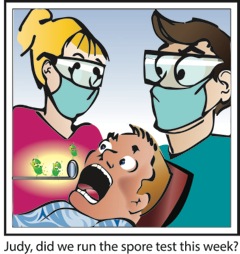Dental employers have a legal obligation to provide a safe workplace. Under requirements enforced by…
Managing Extracted Teeth
Recently, a patient filed a complaint with his state dental board against his dentist for not giving the patient back his extracted teeth. Which begs the question… how should dental healthcare personnel (DHCP) manage extracted teeth?
OSHA does not prohibit DHCP from giving teeth back to patients, upon request, as long as it is done in a safe manner with no employee exposure to blood or other potentially infectious material (OPIM). Once an extracted tooth is returned to a patient, it is no longer considered a potential risk to DHCP, and therefore, it is no longer subject to the provisions of the OSHA Bloodborne Pathogens Standard.
OSHA considers extracted teeth to be potentially infectious material and a potential hazard to employees who come in contact with them. Employees must follow standard precautions when handling extracted teeth. To prepare teeth to give back to patients, the teeth should be cleaned/wiped down with a disinfectant and placed in an impervious container or bag prior to giving back to the patient.
Disposing of Extracted Teeth
If not given back to the patient, the teeth must be disposed of as regulated medical waste, either in the sharps container or as red-bag waste, following your medical waste transporter’s instructions.
Extracted teeth with amalgam should NEVER be disposed as medical waste because the high temperatures used to treat the medical waste can release mercury vapor into the environment. If the tooth contains amalgam, then it is considered universal waste (California) or hazardous waste, and must be either recycled or disposed as hazardous waste.
For our OSHA Review subscribers… please refer to the November/December 2021 Training Document in Section IX of your OSHA Review binder for more information on managing medical waste.
OSHA Review, Inc. a registered continuing education provider in the State of California, specializing in Dental Practice Act, infection control, and Cal/OSHA training. OSHA Review subscribers in California receive updated regulatory compliance and infection control training thorough our bi-monthly newsletter.


